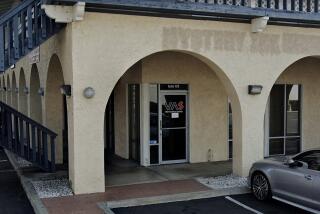It’s ‘Business as Usual’ for Charity Chief Being Sued : Solicitations: The Irvine fund-raiser says he plans a countersuit. Officials may not be able to halt Mitchell Gold’s business until January.
IRVINE — Three Orange County charities continued to solicit money Friday, despite being sued by state authorities the day before for allegedly funneling more than 95% of their contributions into organizers’ hands.
“It was business as usual,” said Mitchell D. Gold, owner of Orange County Charitable Services, the principle fund-raiser for the charities and the main defendant in the state attorney general’s civil suit.
“People have been very receptive to our side of the story,” said Gold, who denies that the charity organizers took an unfair share of the contributions.
Gold, 35, of Irvine said he plans to file a countersuit next week, charging the state attorney general with harassment.
“I’m outraged at what they did,” Gold said. “They spent six months auditing us and the best they come up with is a civil suit. These aren’t criminal charges.”
Deputy Atty. Gen. H. Chester Horn, who is handling the case, said Friday he is attempting to shut the charities down. But, he said, he may not be able to do so until January.
“I’m going to try and get a preliminary injunction against them and freeze their accounts,” Horn said. But before he can go to court on the matter, he said he needs to “get a few depositions from some key witnesses” to bolster his case.
In the meantime, Horn said he will refer his evidence to the U.S. attorney’s office in Los Angeles and the Orange County district attorney’s office and request that a criminal investigation be launched.
“I believe there were some criminal violations,” Horn said.
According to the attorney general’s complaint, Gold and his associates set up United Citizens Against Drugs, American Veterans Assistance Corp. and Stop the Pain as fronts for an illegal fund-raising scheme.
Out of $8.6 million in contributions collected, more than 95% of that money went to the organizers, according to the complaint. The rest of the money paid for high-profile programs such as anti-drug rallies and a homeless shelter, sometimes getting the endorsement of Hollywood celebrities.
The complaint alleges that the charities hired telemarketing companies to phone random households to solicit donations. Once a donation was made, a driver would appear at the donor’s house within an hour to pick up the donation.
The suit, which was filed Thursday in Orange County Superior Court, lists as defendants the three charities and their officers, as well as 50 firms and individuals that Gold’s company hired to solicit money. State authorities say it is one of the largest charity fraud cases they’ve seen.
Even though his case alleges civil violations, Horn said he believes there is evidence to support a criminal complaint.
For example, he said, at least one of the charities became part of the federal employee payroll deduction that allowed federal workers to donate millions of dollars to it by checking a box on a charity form.
To become eligible for the federal program, Horn claims the charities falsified documents about the actual percentage of contributions that went to the charities. Since the documents were mailed through the U.S. Postal Service, he said, the practice may also have involved mail fraud.
Horn said telephone fund-raising pitches falsely claimed that more than 75% of the donations went directly to the charities.
Gold acknowledged that he makes a modest profit from his fund-raising operation, but he denied that he misled anyone about the distribution of the donations.
He said his company--Orange County Charitable Services--was separate from the three charities. Furthermore, he said the charities were explicitly told that they would get 10% of what his company collected.
Although there is no state statute that specifies what portion of charitable donations must go toward the charity, Horn said it is unlawful to misrepresent the figure.
Horn also contends that Gold is closely linked to the charities. The complaint alleges that Gold, with the help of family members, set up the three groups to generate money for his fund-raising company.
More to Read
Sign up for Essential California
The most important California stories and recommendations in your inbox every morning.
You may occasionally receive promotional content from the Los Angeles Times.










